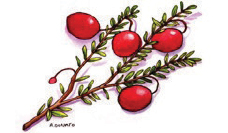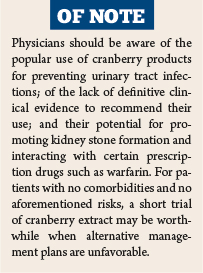The ASCO Post’s Integrative
Oncology series is intended
to facilitate the availability of evidence-
based information on integrative
and complementary therapies
commonly used by patients
with cancer. In this installment,
authors Gary Deng, MD, PhD, and
Jyothirmai Gubili, MS, present the
case study of a woman with a history
of endometrial cancer and urinary
tract infections (UTIs), and
they discuss evidence concerning
the role of cranberry in managing
UTIs as well as its reported anticancer
effects.

Gary Deng, MD, PhD

Jyothirmai Gubili, MS
Scientific Name: Vaccinium macrocarpon
Common Names: Mossberry, sassamanash, bounceberry
Case Study
M.C. is a 55-year-old woman with a history of stage I endometrial cancer, diagnosed and curatively treated 5 years ago. Since then, she has been having urinary tract infections from time to time. They have become more frequent lately. The patient is otherwise healthy and takes no medications on a regular basis.
Nitrofurantoin is offered but declined by the patient, due to fear of chronic use of antibiotics. The patient asks whether there is anything “natural” that would be helpful, in addition to local hygienic care. She asks specifically about cranberry extract, as she has heard from friends that it can be helpful.
Overview
Cranberry is a woody perennial vine native to the northeastern part of North America. Native Americans were the first to use cranberries as food who consumed the red, edible fruits in both fresh and dried forms. The berries were also used medicinally to treat fevers, wounds, swelling, blood disorders, and seasickness.
Today, cranberries continue to be popular for preventing urinary tract infections (UTIs)—the vast majority of which are caused by the bacterium Escherichia coli—and Helicobacter pylori infections, which can lead to gastric cancer. They are also used as antioxidants.
Current clinical evidence on the ability of cranberry to prevent UTIs is mixed. And data to determine its value in treating existing infections are lacking. But some studies have shown that cranberries are useful in preventing dental plaque formation and subsequent gum disease, as well as in suppressing H pylori infection. Its use should be based on a risk/benefit assessment against alternatives.
Because cranberries are hard and bitter, the majority are processed into sauces, juices, drinks, or jams, which are available online and in health food stores. They are also marketed as dietary supplements in the form of extracts, capsules, or tablets.
The Science
Pharmacologic investigations have revealed that cranberries are rich in flavonoids, anthocyanins, proanthocyanidins, catechin, and triterpenoids.1 In preclinical studies, cranberry juice extracts and constituents demonstrated antimicrobial,2 antifungal,3 anti-inflammatory,4 antioxidant,5 and anti-adherence6 effects.
Findings from some studies suggest the utility of cranberry extracts in preventing UTIs in women,7 children,8 and patients with prostate cancer undergoing radiation therapy.9,10 But a trial involving older adults did not report such benefits,11 and a subsequent analysis showed increased costs with no significant reduction in UTI rates in a geriatric nursing home environment.12 Just-published data from randomized studies involving patients having pelvic surgery13 and patients with hip fractures undergoing urinary catheterization14 also indicate the ineffectiveness of cranberry in reducing postoperative bacteriuria.
However, cranberry was found useful in preventing plaque formation and the development of gum disease.15 Furthermore, regular consumption of cranberry juice suppressed H pylori infection,16 a major factor in peptic ulcer disease, which may lead to gastric cancer; it also improved cardiovascular disease risk factors in diabetic men.17
In addition, cranberry extracts and proanthocyanidins have been reported to exert antiproliferative effects against cancers of the esophagus, stomach, colon, bladder, and prostate, as well as glioblastoma and lymphoma, in vivo.18 Human trials have yet to be conducted.
Mechanistic studies have shown that proanthocyanidins inhibit the adherence of E coli fimbriae to uroepithelial cells,19 and A-type linkages in these compounds may enhance urinary bacterial anti-adhesion activities to prevent UTIs.20 Cranberry also prevents H pylori–induced stomach ulcers by inhibiting bacterial adhesions in the stomach lining.21
The anticancer effects of cranberry are thought to be exerted via many different mechanisms, which include inhibition of cancer cell growth by decreasing cyclins, cyclin-dependent kinase expression,22 and matrix metalloprotease activity.23 Dose-response inhibition of gastric cancer cells was shown to be in part due to decreased expression of proliferating cell nuclear antigen induction of apoptosis.24 In neuroblastoma cells, proanthocyanidins induced apoptosis and reactive oxygen species generation, and increased retention of cyclophosphamide, with synergistic cytotoxic benefits.25
Increased risk of uric acid stone formation with cranberry juice results from its acidifying effect and slowing of urate synthesis, thereby reducing urinary pH.26
Adverse Reactions
Consumption of large amounts of cranberry juice (3 cups daily) has been associated with nausea, vomiting, and diarrhea.27
Recurrent kidney stones were reported in a 47-year-old man with severe right renal colic and hematuria who took cranberry concentrate tablets twice daily over 6 months.28
Several cases of increased international normalized ratio occurred due to suspected interactions between warfarin and cranberry juice.29,30
Internal hemorrhage and subsequent death were reported in two patients with the concurrent use of warfarin and cranberry juice.31,32
Herb-Drug Interactions
Warfarin: Cranberry juice may increase warfarin-induced anticoagulation, but data are conflicting.33-35
Uridine 5′-diphospho-glucuronosyltransferase substrates: Cranberry modulates uridine 5′-diphospho-glucuronosyltransferase enzymes in vitro and can increase the risk of side effects of drugs metabolized by them.36
Cytochrome P450 (CYP) substrates: Cranberry inhibits enteric CYP3A activities and may interfere with the absorption of substrate drugs.37 It also inhibits CYP2C9 in vitro, but this activity was not observed in humans.38
Cyclosporine: In a randomized clinical trial, 240 mL of cranberry juice had no clinically significant effect on the disposition of a 200-mg dose of cyclosporine.39
Contraindications
Cranberry use should be limited in patients with a history of nephrolithiasis, because it can increase urinary oxalate excretion and can promote the formation of the most common type of kidney stones (ie, calcium oxalate).26 ■
Disclosure: Dr. Deng and Ms. Gubili reported no potential conflicts of interest.
References
1. Raz R, Chazan B, Dan M: Cranberry juice and urinary tract infection. Clin Infect Dis 38:1413-1419, 2004.
2. Dinh J, Angeloni JT, Pederson DB, et al: Cranberry extract standardized for proanthocyanidins promotes the immune response of Caenorhabditis elegans to Vibrio cholerae through the p38 MAPK pathway and HSF-1. PLoS One 9:e103290, 2014.
3. Rane HS, Bernardo SM, Howell AB, et al: Cranberry-derived proanthocyanidins prevent formation of Candida albicans biofilms in artificial urine through biofilm- and adherence-specific mechanisms. J Antimicrob Chemother 69:428-436, 2014.
4. Tipton DA, Babu JP, Dabbous M: Effects of cranberry components on human aggressive periodontitis gingival fibroblasts. J Periodontal Res 48:433-442, 2013.
5. Denis MC, Desjardins Y, Furtos A, et al: Prevention of oxidative stress, inflammation and mitochondrial dysfunction in the intestine by different cranberry phenolic fractions. Clin Sci (Lond) 128:197-212, 2015.
6. Girardot M, Guerineau A, Boudesocque L, et al: Promising results of cranberry in the prevention of oral Candida biofilms. Pathog Dis 70:432-439, 2014.
7. Kontiokari T, Sundqvist K, Nuutinen M, et al: Randomised trial of cranberry-lingonberry juice and Lactobacillus GG drink for the prevention of urinary tract infections in women. BMJ 322:1571, 2001.
8. Ferrara P, Romaniello L, Vitelli O, et al: Cranberry juice for the prevention of recurrent urinary tract infections: A randomized controlled trial in children. Scand J Urol Nephrol 43:369-372, 2009.
9. Hamilton K, Bennett NC, Purdie G, et al: Standardized cranberry capsules for radiation cystitis in prostate cancer patients in New Zealand: A randomized double blinded, placebo controlled pilot study. Support Care Cancer 23:95-102, 2015.
10. Bonetta A, Di Pierro F: Enteric-coated, highly standardized cranberry extract reduces risk of UTIs and urinary symptoms during radiotherapy for prostate carcinoma. Cancer Manag Res 4:281-286, 2012.
11. Caljouw MA, van den Hout WB, Putter H, et al: Effectiveness of cranberry capsules to prevent urinary tract infections in vulnerable older persons: A double-blind randomized placebo-controlled trial in long-term care facilities. J Am Geriatr Soc 62:103-110, 2014.
12. Juthani-Mehta M, Van Ness PH, Bianco L, et al: Effect of cranberry capsules on bacteriuria plus pyuria among older women in nursing homes: A randomized clinical trial. JAMA 316:1879-1887, 2016.
13. Letouzey V, Ulrich D, Demattei C, et al: Cranberry capsules to prevent nosocomial urinary tract bacteriuria after pelvic surgery: A randomised controlled trial. BJOG. February 10, 2017 (early release online).
14. Gunnarsson AK, Gunningberg L, Larsson S, et al: Cranberry juice concentrate does not significantly decrease the incidence of acquired bacteriuria in female hip fracture patients receiving urine catheter: A double-blind randomized trial. Clin Interv Aging 12:137-143, 2017.
15. Yamanaka A, Kimizuka R, Kato T, et al: Inhibitory effects of cranberry juice on attachment of oral streptococci and biofilm formation. Oral Microbiol Immunol 19:150-154, 2004.
16. Zhang L, Ma J, Pan K, et al: Efficacy of cranberry juice on Helicobacter pylori infection: A double-blind, randomized placebo-controlled trial. Helicobacter 10:139-145, 2005.
17. Shidfar F, Heydari I, Hajimiresmaiel SJ, et al: The effects of cranberry juice on serum glucose, apoB, apoA-I, Lp(a), and paraoxonase-1 activity in type 2 diabetic male patients. J Res Med Sci 17:355-360, 2012.
18. Weh KM, Clarke J, Kresty LA: Cranberries and cancer: An update of preclinical studies evaluating the cancer inhibitory potential of cranberry and cranberry derived constituents. Antioxidants (Basel) 5:E27, 2016.
19. Gupta K, Chou MY, Howell A, et al: Cranberry products inhibit adherence of p-fimbriated Escherichia coli to primary cultured bladder and vaginal epithelial cells. J Urol 177:2357-2360, 2007.
20. Krueger CG, Reed JD, Feliciano RP, et al: Quantifying and characterizing proanthocyanidins in cranberries in relation to urinary tract health. Anal Bioanal Chem 405:4385-4395, 2013.
21. Burger O, Weiss E, Sharon N, et al: Inhibition of Helicobacter pylori adhesion to human gastric mucus by a high-molecular-weight constituent of cranberry juice. Crit Rev Food Sci Nutr 42(3 suppl):279-284, 2002.
22. Deziel B, MacPhee J, Patel K, et al: American cranberry (Vaccinium macrocarpon) extract affects human prostate cancer cell growth via cell cycle arrest by modulating expression of cell cycle regulators. Food Funct 3:556-564, 2012.
23. Deziel BA, Patel K, Neto C, et al: Proanthocyanidins from the American Cranberry (Vaccinium macrocarpon) inhibit matrix metalloproteinase-2 and matrix metalloproteinase-9 activity in human prostate cancer cells via alterations in multiple cellular signalling pathways. J Cell Biochem 111:742-754, 2010.
24. Liu M, Lin LQ, Song BB, et al: Cranberry phytochemical extract inhibits SGC-7901 cell growth and human tumor xenografts in Balb/c nu/nu mice. J Agric Food Chem 57:762-768, 2009.
25. Singh AP, Lange TS, Kim KK, et al: Purified cranberry proanthocyanidines (PAC-1A) cause pro-apoptotic signaling, ROS generation, cyclophosphamide retention and cytotoxicity in high-risk neuroblastoma cells. Int J Oncol 40:99-108, 2012.
26. Gettman MT, Ogan K, Brinkley LJ, et al: Effect of cranberry juice consumption on urinary stone risk factors. J Urol 174:590-594, 2005.
27. Wing DA, Rumney PJ, Preslicka CW, et al: Daily cranberry juice for the prevention of asymptomatic bacteriuria in pregnancy: A randomized, controlled pilot study. J Urol 180:1367-1372, 2008.
28. Terris MK, Issa MM, Tacker JR: Dietary supplementation with cranberry concentrate tablets may increase the risk of nephrolithiasis. Urology 57:26-29, 2001.
29. Hamann GL, Campbell JD, George CM: Warfarin-cranberry juice interaction. Ann Pharmacother 45:e17, 2011.
30. Roberts D, Flanagan P: Case report: Cranberry juice and warfarin. Home Healthc Nurse 29:92-97, 2011.
31. Griffiths AP, Beddall A, Pegler S: Fatal haemopericardium and gastrointestinal haemorrhage due to possible interaction of cranberry juice with warfarin. J R Soc Promot Health 128:324-326, 2008.
32. Suvarna R, Pirmohamed M, Henderson L: Possible interaction between warfarin and cranberry juice. BMJ 327:1454, 2003.
33. Greenblatt DJ, von Moltke LL, Perloff ES, et al: Interaction of flurbiprofen with cranberry juice, grape juice, tea, and fluconazole: In vitro and clinical studies. Clin Pharm Ther 79:125-133, 2006.
34. Mohammed Abdul MI, Jiang X, Williams KM, et al: Pharmacodynamic interaction of warfarin with cranberry but not with garlic in healthy subjects. Brit J Pharmacol 154:1691-1700, 2008.
35. Ansell J, McDonough M, Zhao Y, et al: The absence of an interaction between warfarin and cranberry juice: A randomized, double-blind trial. J Clin Pharmacol 49:824-830, 2009.
36. Mohamed ME, Frye RF: Effects of herbal supplements on drug glucuronidation: Review of clinical, animal, and in vitro studies. Planta Med 77:311-321, 2011.
37. Kim E, Sy-Cordero A, Graf TN, et al: Isolation and identification of intestinal CYP3A inhibitors from cranberry (Vaccinium macrocarpon) using human intestinal microsomes. Planta Med 77:265-270, 2011.
38. Ushijima K, Tsuruoka S, Tsuda H, et al: Cranberry juice suppressed the diclofenac metabolism by human liver microsomes, but not in healthy human subjects. Brit J Clin Pharmacol 68:194-200, 2009.
39. Grenier J, Fradette C, Morelli G, et al: Pomelo juice, but not cranberry juice, affects the pharmacokinetics of cyclosporine in humans. Clin Pharm Ther 79:255-262, 2006.





